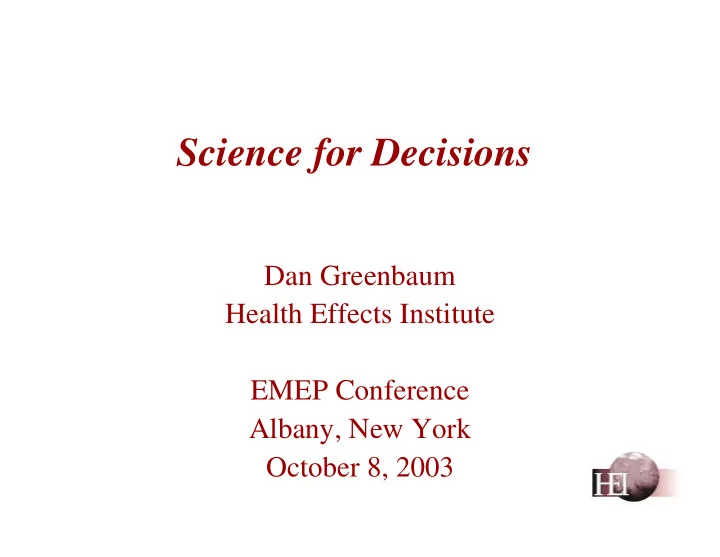

Science for Decisions Dan Greenbaum Health Effects Institute EMEP Conference Albany, New York October 8, 2003
Science for Decisions • The Context – How science informs policy • At the Edge: two very different worlds • A few suggestions for the science community
The Context: How “Science” Becomes Rules Regulatory “Science” Legislative or Regulatory - Academic Studies Action - Agency In-house studies -Monitoring reports Industry, The Environmentalists Public Media Coverage
At the Edge: The Two Very Different Worlds of Science and Policy • Scientists seek long-term, robust “findings” (always with caveats) • Policy Makers want “answers.” NOW. • Scientists : value objectivity, facts • Policy Makers : see facts as advocacy tools • Scientists : prefer “basic” science • Policy Makers : need “applied” science • Science : at its best in controlled laboratory conditions • Policy makers : want “real-world” effects on humans and ecosystems • Scientists : want science at the center of decisions • Policy makers : science one among technical, political, economic factors
zyxwvutsrqponmlkjihgfedcbaYWTSRQPONMLIHGFEDCBA Two Worlds in Action: The 1997 PM NAAQS Debate • The Science: • Growing number of epidemiology studies associate health with PM levels • Little toxicological evidence of mechanism • The Proposal from EPA: • New, more stringent NAAQS for PM 2.5 • The Debate: • Some science: No data for PM 2.5 , No mechanism, • Hot issue: “Hidden” data (Harvard Six Cities Study) • The Hearings: Science and Policy collide
Two Different Worlds • Substantial Differences in approach and needs • Further complicated by other interpreters • Stakeholders, media • What can the science community do? • A few suggestions
Suggestion: Strategic Science • Good science requires a long lead time • The key policy questions will be shaped by many: • Legislators, regulators, environmentalists, industry • Science needs to better understand what is coming up in the policy world • Input from all key parties • Science started strategically now • with a target 510 years in the future
Strategic Science Planning • NRC Committee on PM Research Needs • Created in wake of 1997 debate • Developed 14year “portfolio” of priority research • EPA now implementing multiyear research plans • HEI Strategic Plan • Every five years • Extensive consultation with decision makers, stakeholders • Targeted at major upcoming decisions at 5 and 10 year time frames
Example: HEI Strategic Plan
Suggestion: Science to Maximize Credibility • Individual Scientists Produce Individual Results • Some scientists attempt to advocate based on them • Stakeholders, Media overemphasize individual studies • Result : • The public, and decision makers, left to choose among conflicting scientific views;
Suggestion: Science to Maximize Credibility • An Alternative : • Panels of scientists drawing from entire literature • Intensive, independent peer review • Examples: • Intergovernmental Panel on Climate Change (IPCC) • NRC and HEI reports
Scientific “consensus” builds credibility
Suggestion: Improved Translation, Communication • Science and Policy speak different languages • Science translated for policy makers by many: • Agency staff, legislative aides • Stakeholders, media • There are some good translators out there • But adversarial nature of process lends itself to distortion, “cherrypicking” the results • Science Communication will never be perfect • But scientists could do a better job
Thoughts for better communication by scientists • Recognize that communication STARTS (rather than ends) with the publication of the report • Be prepared to engage in briefings, hearings, etc. to help get the “story” right • Learn to write plain English abstracts and summaries • Don’t let advocates, media, write them for you • Don’t hide behind jargon (e.g. “heart attacks” vs. MI) • Make clear what we know… • and what we don’t know
zyxwvutsrqponmlkjihgfedcbaYWTSRQPONMLIHGFEDCBA Summary: Improving the way science informs policy • Science has a real and important role to play in improving policy • But it is and will never be easy • Policy making is a complex and contentious world quite different from the world of science • Scientists can improve their chances of informing decisions: • Thinking Ahead : strategic science planning • Working Together : building scientific consensus • Speaking Plainly : communicating better
Thank You dgreenbaum@healtheffects.org www.healtheffects.org
Recommend
More recommend